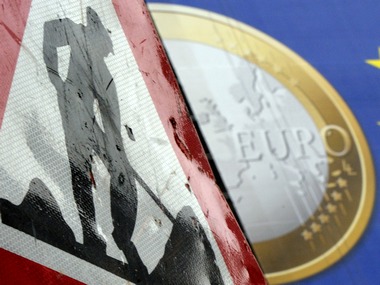Would a eurozone crash be good for India?
The answer is, of course, no: any crash in the eurozone will have a negative fallout for India in the short term. But consider the opposite possibility.
When Lehman collapsed in 2008, the US economy tanked and went into recession. Capital turned risk-averse, and the Indian market crashed in sympathy. The rupee fell below Rs 50 quickly.
But what’s interesting is the story after that.
In 2008, inflation was surging past double-digits, and the Reserve Bank was feverishly raising interest rates. As it has been doing till recently.
[caption id=“attachment_152341” align=“alignleft” width=“380” caption=“The eurozone will have a recession regardless of whether the euro stays intact or collapses. Reuters”]  [/caption]
But a year later, when the global economy slowed, inflation in India actually fell below zero for a brief while. It hit -1.6 percent in June 2009.
Look at what happened in the stock markets. The BSE Sensex peaked in January 2008 at over 21,207, bottomed out in October that year at 7,697, rebounded to a second peak in May 2010 at 21,108, and hit another low of 15,478 last month. On Friday, it closed at 16,213.
Now, let’s assume Europe’s horror show continues and recession sets in. We can then expect a worst-case scenario of the Sensex going below 10,000 quickly, before beginning its slow climb in 2012.
The eurozone will have a recession regardless of whether the euro stays intact or collapses. If it is the former, we will have a serious recession. If it is the latter - unlikely - we will have a dramatic drop in European GDP of 10-25 percent over the next couple of years. According to Dutch bank ING, the countries of the eurozone could contract 9 percent in 2012, and the contraction would continue in 2013, too.
As European banks deleverage and capital gets scarce, this is what could happen:
One, the rupee will continue to rule weak - making Indian exports more competitive than before.
Two, as Europe contracts, and America too slows down again, the prices of oil and other commodities will fall. ING has forecast that oil will fall to nearly $55 a barrel if the eurozone implodes. India will be the biggest beneficiary.
Three, statistically, due to the high base effect (current high inflation) wholesale price inflation will show a larger fall in 2012 if Europe implodes. This is what happened in 2009, when WPI inflation went below zero. In one year, inflation went from double-digits to negative. This could happen again.
Four, in reality, domestic prices will fall less in real terms, and improve corporate profitability - especially if the rupee stays weak.
Says economist Ajay Shah: “Firm profitability has dropped sharply in 2011. My prediction is that firms producing tradeables will show better profitability in Oct-Nov-Dec 2011 when compared with the previous quarter, thanks to the rupee depreciation.”
Shah explains how this works: “It is important to focus on the things that are tradeable and not just on the things that are imported…(for example) there are many transactions between a domestic producer of steel and a domestic buyer of steel. The buyer and seller are both in India. But the price at which they transact is the world price of steel (which is quoted in dollars) multiplied by the rupee-dollar exchange rate. This situation is called ‘import parity pricing’. Through this, the domestic prices of tradeables goes up when the rupee depreciates.”
So even if the market heads south in the next few weeks as eurozone leaders tie themselves in knots over what to do, one should expect a dramatic drop in inflation and a quick market rebound in the second half of 2012 at the latest.
With one proviso: the UPA does not screw up further.


)
)
)
)
)
)
)
)
)



